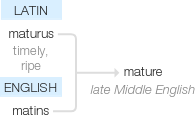Mature
late Middle English: from Latin maturus ‘timely, ripe’; perhaps related to matins.
wiktionary
Borrowed from Middle French mature, from Latin mātūrus. Doublet of maduro. Partially displaced ripe, from Old English rīpe(“ripe, mature”).
From French maturer(“to mature”), from Latin mātūrō.
etymonline
mature (v.)
c. 1400, maturen, "encourage suppuration;" mid-15c., of plants, "cause to ripen, bring to maturity," from Latin mātūrare "to ripen, bring to maturity," from mātūrus "ripe, timely, early," related to māne "early, of the morning," from PIE *meh-tu- "ripeness." De Vaan writes that "The root is probably the same as in mānus 'good'." Intransitive sense of "come to a state of ripeness, become ripe or perfect" is from 1650s. The financial sense of "reach the time for payment" is by 1861. Related: Matured; maturing.
mature (adj.)
mid-15c., of fruits, "ripe, complete in natural growth or development," also, of deliberations, etc., "careful, well-considered, thorough," from Latin mātūrus "ripe, timely, early" (see mature (v.)). Of persons, "having fully developed powers of body and mind," c. 1600. The euphemistic sense of "older than usual" is by 1953.
